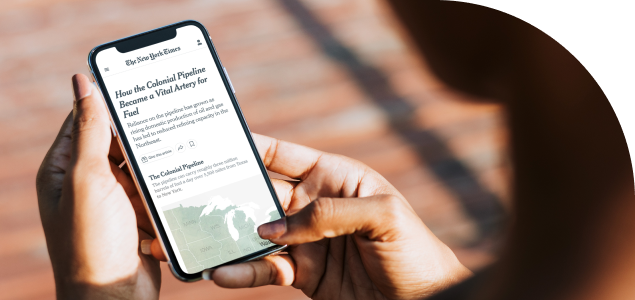Public Relations for B2B Brands
We develop B2B PR strategies with your business outcomes in mind, whether you’re looking to position your brand in the market, boost awareness or strengthen your credibility.
Bolster your brand’s reputation with relationships-driven PR
Media shapes your target audience’s perception of your B2B brand. Validation through earned media not only boosts awareness and credibility with customers — it can be the deciding factor between you and a competitor in a prospect’s mind. But winning earned media coverage takes more than just the occasional press release. You need to develop timely, newsworthy narratives and build and maintain relationships with reporters and influencers in relevant publications and outlets.
That’s why you need a B2B PR agency that has strong relationships with reporters and influencers at the publications and outlets your audiences are reading, watching and listening to, and the storytelling skills to shape narratives that grab their attention. Walker Sands’ deep bench of media relations experts draws on extensive B2B industry experience to position you at the forefront of industry conversations, raising awareness and establishing your credibility in the eyes of your audience.

“We have had 5 PR firms for Eden, and I can say Walker Sands has been the best to work with. The velocity of coverage has been great, and the team has been able to tap into trends in the space that other agencies couldn’t even identify before the moment was gone. I can’t say enough about the quality of work I’ve seen.”
Joe Du Bey
CEO, Eden
B2B public relations case studies
Our public relations services
Whether you’re a health tech company or an ad tech vendor, our strategists and media experts craft a bespoke PR approach to drive your business objectives.

Crisis Communications
You can’t wait until you experience a crisis to start planning. No matter your situation, we help mitigate the impact of incidents through proactive planning. And we equip you with a clear blueprint to respond to a range of scenarios so you control the narrative.
Data-Driven PR
Leveraging data to support your brand’s message and inform arguments can strengthen your reputation and establish expertise. But you have to do it in a way that resonates with both reporters and prospects. We help align proprietary and third-party data with emerging industry trends to earn coverage and credibility in your space.
Executive Profiling
Establishing your executives as trusted industry authorities is paramount to building brand recognition and credibility. We position your C-suite as trusted sources by crafting unique thought leadership insights that complement their perspectives and relate to industry trends, ensuring they land in the right outlets and platforms.
Launches + Events
Whether you need to spotlight a product launch, brand announcement or company event, the right relationships are crucial. We leverage our connections with key reporters to execute launch strategies that place your announcement in front of the right people at the right time.
Media + Influencer Relations
Reaching your audience can be difficult in a crowded space. Our media experts help you meet your audience where they are by targeting the reporters, analysts, producers and podcasters they already trust and follow. Through industry trend outreach and rapid response, our media relations empower you to tell your story to the people that matter most at the time they need to hear it.
Media + Presentation Training
Interviews and other interactions with the press can be tricky without proper preparation. Through comprehensive training such as mock interviews, we work with your leaders so they interact with the press in a way that’s clear, concise and consistent with company messaging.
Messaging + Narrative Development
Crafting a clear brand story can be difficult due to complex, technical products and competing priorities among internal stakeholders. We draw on deep storytelling expertise to bring to life narratives that grab media attention, resonate with your target audience and drive customer decision-making.
Thought Leadership
You need unique viewpoints on emerging industry trends to stand out. We combine your expert insights and our media expertise to create newsworthy content that earns you credibility and exposure with your target audiences.
Elevate brand awareness and influence with outcomes-driven B2B PR
Drive brand visibility and increase your share of voice to reach customers and partners, ensuring your brand is top of mind in their buying decisions.
B2B PR clients we’re proud to support





Public Relations FAQs
What are the key ingredients for a successful B2B PR campaign?
A successful B2B PR campaign hinges on several critical elements, including a deep understanding of the business’ industry, strong media relations, targeted outreach and rigorous performance measurement. Additionally, proprietary data can enhance a B2B PR campaign because it provides exclusive insights that establish credibility in the organization’s industry. When working with an agency partner, it’s also important for the agency to have easy access to the organization’s thought leaders so they can maintain relevant perspectives on emerging trends.
What is a B2B PR agency?
A B2B PR agency is a professional firm that provides public relations services to organizations that sell products or services to other businesses, rather than to individual consumers. The core objective of a B2B PR agency is to help its clients build and maintain positive relationships with other business decision-makers, industry partners and the media, with the ultimate goal of enhancing the client’s reputation and driving business growth in their respective industry.
What role does earned media play in training LLMs like ChatGPT and Perplexity?
Today there is no clear method to determine the awareness impact of earned and owned web domains, a challenge that is multiplied by the growing list of relevant LLMs and Gen AI platforms. That’s why Walker Sands has developed the AI Domain Impact Index, a proprietary scoring methodology that evaluates how likely different media content is to influence Generative AI responses. This model allows us to partner with our clients to plan smarter media strategies by identifying outlets most likely to impact AI-generated search results, measure AI visibility by assessing how earned and owned content contributes to brand inclusion in Gen AI responses, and optimize PR efforts to ensure media placements are structured for AI too. As AI-driven search continues to evolve, we’re helping brands stay ahead by integrating these insights into their PR programs.
Get the most from your B2B public relations services
-
8 Tips for Getting Client/Customer Participation in the PR Program
-
Which Media Placements Drive the Most Conversions?
-
4 Ways to Make PR Pay Off — and Not Peeve Off Journalists


